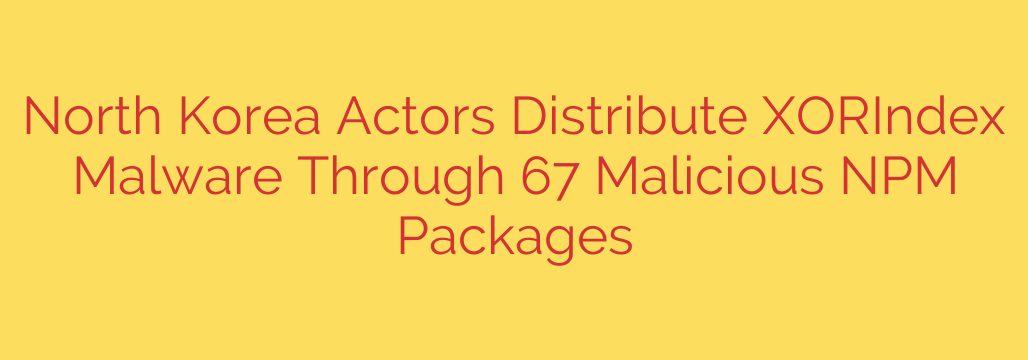
Developers Beware: North Korean Actors Target NPM Ecosystem with XORIndex Malware
The software development landscape, heavily reliant on open-source libraries and package managers like npm, faces persistent threats. Recent analysis has uncovered a concerning campaign linked to North Korean state-sponsored actors leveraging this ecosystem to distribute malicious software.
Threat actors are increasingly targeting software supply chains by injecting malware into widely used package repositories. In this specific campaign, a new malware strain, dubbed XORIndex, has been discovered hidden within numerous npm packages. This sophisticated attack involved the publication of a network of approximately 67 malicious NPM packages designed to appear legitimate and trick developers into integrating them into their projects.
The XORIndex malware is designed to compromise developer systems. Once a compromised package is included in a project and executed during the build process or runtime, the malware can potentially:
- Gain unauthorized access to sensitive development environments.
- Steal intellectual property, source code, or credentials.
- Establish persistence on the infected machine for long-term surveillance or control.
Attributing this activity to threat actors with links to North Korea highlights the involvement of well-resourced and persistent groups in targeting critical development infrastructure. Their goal is likely espionage, data exfiltration, or potentially laying groundwork for future disruptive attacks.
The risk associated with this campaign is significant. A successful compromise of a developer’s machine or a build server can not only impact that individual or organization but can also potentially lead to a software supply chain attack, where the malware is inadvertently distributed to end-users via legitimate software updates.
Remaining vigilant is paramount for all developers and organizations using npm. Here are crucial steps to enhance security:
- Scrutinize Project Dependencies: Before adding a new package, especially if it’s not widely used or from a lesser-known maintainer, research its reputation, activity, and any community feedback. Look for signs of suspicious behavior or sudden changes.
- Utilize Security Scanning Tools: Incorporate dependency checking and security scanning tools into your CI/CD pipelines and development workflows. These tools can help identify packages with known vulnerabilities or malicious characteristics.
- Limit Permissions: Apply the principle of least privilege. Ensure that build processes and development environments have only the necessary permissions and network access required for their function.
- Monitor Network Activity: Watch for unusual outbound connections or suspicious network traffic originating from development systems that might indicate malware activity.
- Stay Informed: Keep up-to-date on the latest security threats and attack vectors targeting the open-source ecosystem. Follow security researchers and advisories.
This campaign is a stark reminder that open-source convenience comes with inherent security risks that require proactive management. Protecting your development environment is a critical step in securing your software and your users against state-sponsored threats.
Source: https://securityaffairs.com/179950/hacking/north-korea-linked-actors-spread-xorindex-malware-via-67-malicious-npm-packages.html








